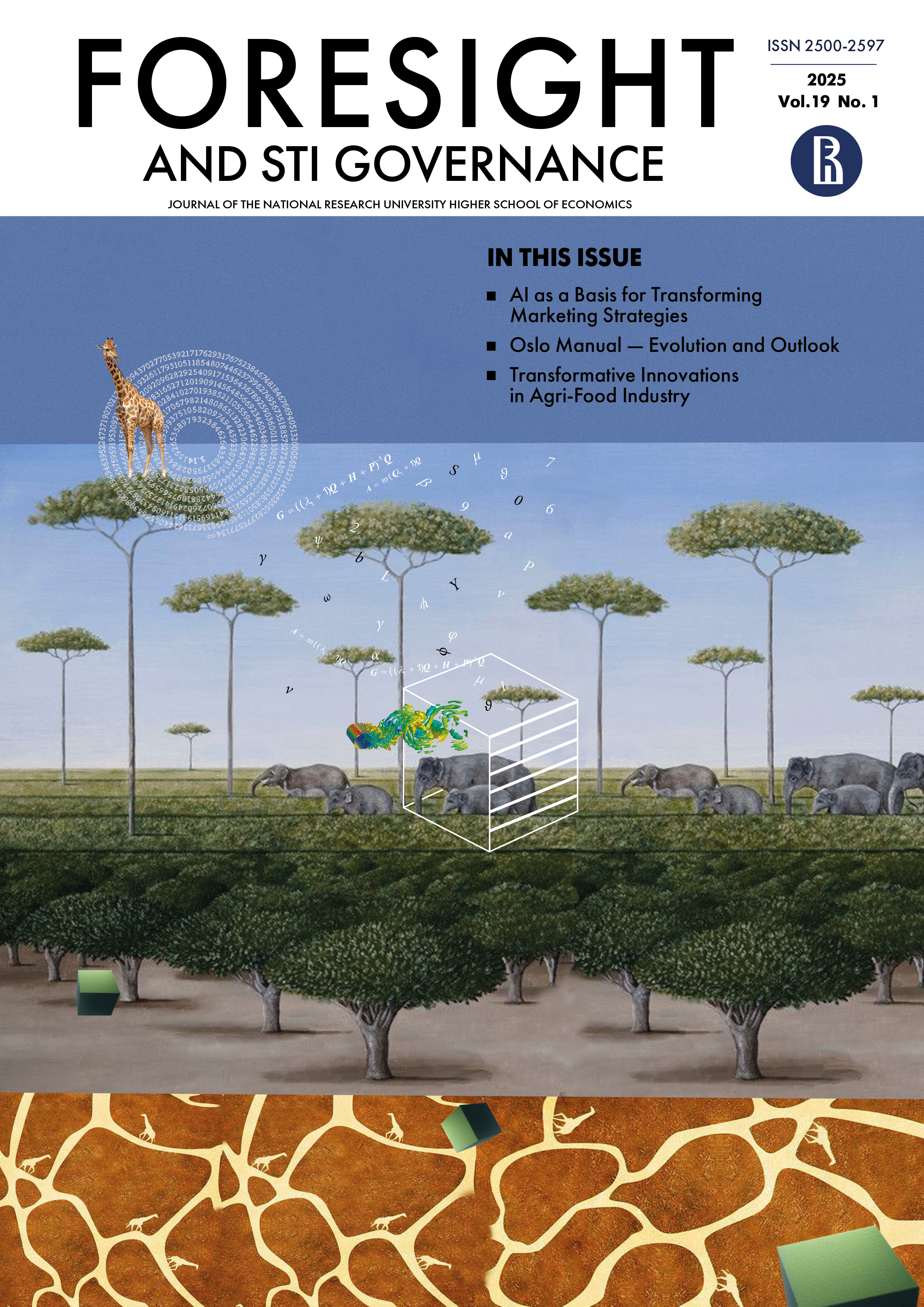Abstract
This study explores the potential for small marketing firms to disrupt the market by leveraging generative AI technology within the framework of disruptive innovation theory. A qualitative approach was employed, combining a comprehensive literature review with in-depth interviews with leaders from small marketing firms. The data was analyzed using the Natural Language Processing (NLP) and thematic analysis techniques. This study is the first to apply the theory of disruptive innovation to the use of generative AI at small marketing firms. It contributes to the emerging body of knowledge on AI in marketing and offers practical guidance for scholars and practitioners to advance this field. The findings suggest that small firms can gain a competitive edge by adopting AI early, utilizing it to target underserved markets, and developing innovative, cost-effective services. The study positions generative AI as a significant technological evolution, with the potential to revolutionize the marketing industry. It identifies generative AI as a tool for enhancing efficiency, content development, customer service, and research. Small marketing firms are found to be in various stages of AI adoption, with many viewing it as a complement to human creativity. This study highlights the need for new skills, such as AI literacy and strategic thinking, while also emphasizing the continued importance of human oversight.
References
Acemoglu D., Autor D., Hazell J., Restrepo P. (2022) Artificial Intelligence and Jobs: Evidence from Online Vacancies. Journal of Labor Economics, 40(S1), 293-340. https://doi.org/10.1086/718327.
Ameen N., Sharma G.D., Tarba S., Rao A., Chopra R. (2022) Toward advancing theory on creativity in marketing and artificial intelligence. Psychology & Marketing, 39(9), 1802-1825. https://doi.org/10.1002/MAR.21699.
Beckett D. (2021) The New Agency Model: Adapt or Die. Entrepreneur, 12.07.2021. https://www.entrepreneur.com/business-news/the-new-agency-model-adapt-or-die/376528, дата обращения 18.10.2024.
Bower J.L., Christensen C.M. (1995) Disruptive Technologies: Catching the Wave. Harvard Business Review, May 1995, 43-53.
Canavan D., Scott P.S., Mangematin V. (2013) Creative professional service firms: Aligning strategy and talent. Journal of Business Strategy, 34(3), 24-32. https://doi.org/10.1108/JBS-10-2012-0058/FULL/PDF.
Chen J., Zhu Z., Zhang Y. (2017) A study of factors influencing disruptive innovation in Chinese SMEs. Chinese SMEs, Asian Journal of Technology Innovation, 25(1), 140-157. https://doi.org/10.1080/19761597.2017.1302552.
Christensen C., Raynor M., Anthony S. (2003) Six Keys to Building New Markets by Unleashing Disruptive Innovation - HBS Working Knowledge, Cambridge, MA: Harvard Business School Press.
Christensen C.M., Raynor M., McDonald R. (2015) What is Disruptive Innovation? Harvard Business Review, 93(12), 44-53.
Davenport T., Guha A., Grewal D., Bressgott T. (2020) How artificial intelligence will change the future of marketing. Journal of the Academy of Marketing Science, 48(1), 24-42. https://doi.org/10.1007/S11747-019-00696-0/FIGURES/2.
Dilmegani C. (2023) Generative AI in Marketing: Benefits & 7 Use Cases in 2023. AIMultiple, 25.10.2023. https://research.aimultiple.com/generative-ai-in-marketing/, дата обращения 18.10.2024.
Fitzgerald M., Kruschwitz N., Bonnet D., Welch M. (2013) Embracing Digital Technology. A New Strategic Imperative. MIT Sloan Management Review, 07.10.2023. https://sloanreview.mit.edu/projects/embracing-digital-technology/, дата обращения 18.10.2024.
Gill L. (2023) Generative AI In Marketing: 5 Use Cases. Forbes, 03.04.2023. https://www.forbes.com/sites/forbescommunicationscouncil/2023/04/03/generative-ai-in-marketing-5-use-cases/?sh=3ced10c046dd, дата обращения 09.10.2024.
Graham M. (2023) Five Things Marketers Should Know About Generative AI in Advertising. Wall Street Journal, 16.03.2023. https://www.wsj.com/articles/five-things-marketers-should-know-about-generative-ai-in-advertising-5381c1d0, дата обращения 15.09.2024.
Harris Z. (2024) AI Content Creation Tools: 7 Tools to Supercharge Production. Copy.Ai, 26.06.2024. https://www.copy.ai/blog/ai-content-creation, дата обращения 08.09.2024.
Hoffman D.L., Moreau C.P., Stremersch S., Wedel M. (2022) The Rise of New Technologies in Marketing: A Framework and Outlook. Journal of Marketing, 86(1), 1-6. https://doi.org/10.1177/00222429211061636.
Kapoor N. (2017) Agency of the future: Next-generation operating models for marketing agencies, London: PWC.
Kassicieh S.K., Kirchhoff B.A., Walsh S.T., McWhorter P.J. (2002) The role of small firms in the transfer of disruptive technologies. Technovation, 22(11), 667-674. https://doi.org/10.1016/S0166-4972(01)00064-5.
Larsen B., Narayan J. (2023) Generative AI - a game-changer society needs to be ready for, Geneva: World Economic Forum.
Larson C. (2016) What Is Disruptive Innovation Theory? 4 Key Concepts. HBS Online, 15.11.2016. https://online.hbs.edu/blog/post/4-keys-to-understanding-clayton-christensens-theory-of-disruptive-innovation, 04.04.2023.
Lee P.S., Chakraborty I., Banerjee S. (2023) Artificial Intelligence Applications to Customer Feedback Research: A Review. In: Artificial Intelligence in Marketing (eds. K. Sudhir, O. Toubia), Bingley (UK): Emerald, pp. 169-190. https://doi.org/10.1108/S1548-643520230000020010.
Leeflang P.S.H., Verhoef P.C., Dahlström P., Freundt T. (2014) Challenges and solutions for marketing in a digital era. European Management Journal, 32(1), 1-12. https://doi.org/10.1016/j.emj.2013.12.001.
Montana P.J., Petit F., McKenna T.M. (2014) Marketing executive development in a changing world: The needed executive skills. Journal of Management Development, 33(1), 48-56. https://doi.org/10.1108/JMD-11-2013-0136.
Nogami V.K., Veloso A.R. (2017) Disruptive innovation in low-income contexts: Challenges and state-of-the-art national research in marketing. RAI Revista de Administração e Inovação, 14(2), 162-167. https://doi.org/10.1016/J.RAI.2017.03.005.
O’Reilly C., Binns A.J.M. (2019) The three stages of disruptive innovation: Idea generation, incubation, and scaling. California Management Review, 61(3), 49-71. https://doi.org/10.1177/0008125619841878.
Pérez-Luño A., Wiklund J., Cabrera R.V. (2011) The dual nature of innovative activity: How entrepreneurial orientation influences innovation generation and adoption. Journal of Business Venturing, 26(5), 555-571. https://doi.org/10.1016/J.JBUSVENT.2010.03.001.
Ritz W., Wolf M., Mcquitty S. (2019) Digital marketing adoption and success for small businesses: The application of the do-it-yourself and technology acceptance models. Article in Journal of Research in Interactive Marketing, 13(2), 179-203. https://doi.org/10.1108/JRIM-04-2018-0062.
Rust R.T., Smith R.H., Lilien G.L. (2019) The future of marketing. International Journal of Research in Marketing, 37(1), 15-26. https://doi.org/10.1016/j.ijresmar.2019.08.002.
Singh J., Flaherty K., Sohi R.S., Deeter-Schmelz D., Habel J., Le Meunier-Fitzhugh K., Malshe A., Mullins R., Onyemah V. (2019) Sales Profession and Professionals in the Age of Digitization and Artificial Technologies: Concepts, Priorities, and Questions. Journal of Personal Selling & Sales Management, 39(1), 2-22. https://doi.org/10.1080/08853134.2018.1557525.
Wijayati D.T., Rahman Z., Fahrullah A., Rahman M.F.W., Arifah I.D.C., Kautsar A. (2022) A study of artificial intelligence on employee performance and work engagement: The moderating role of change leadership. International Journal of Manpower, 43(2), 486-512. https://doi.org/10.1108/IJM-07-2021-0423/FULL/XML.

This work is licensed under a Creative Commons Attribution 4.0 International License.


